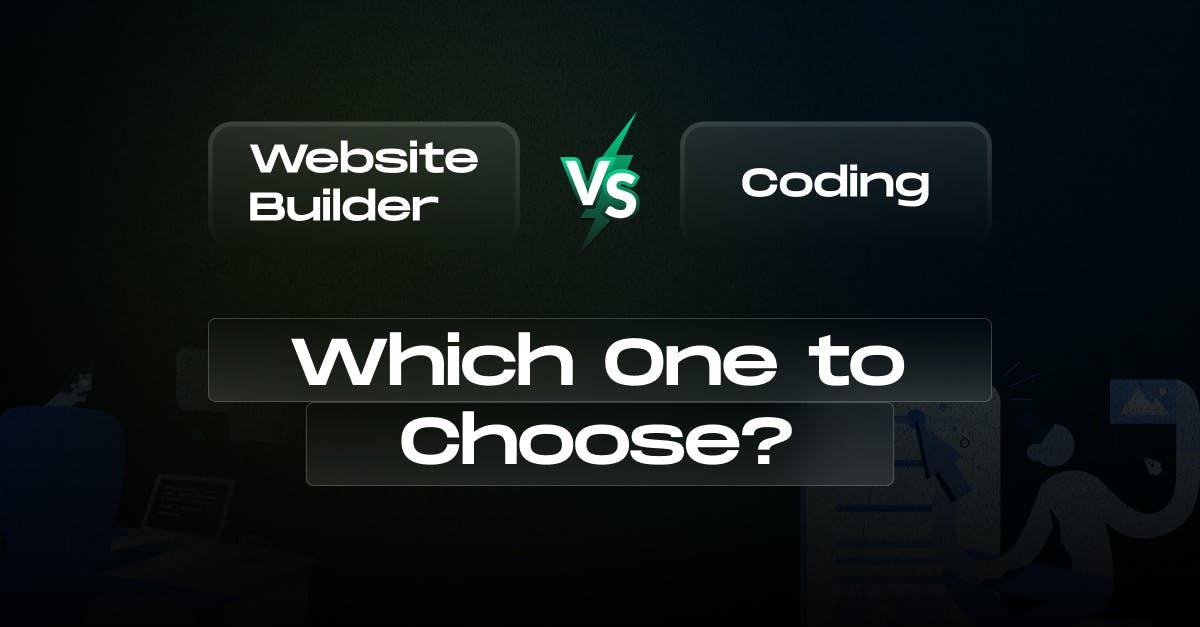March 11, 2025
Website Builder vs Coding: Which One to Choose?

Nusrat Sarmin

What’s the best way to build your website—using a website builder or coding it from scratch? This question comes up often, especially when you want a site that’s both visually appealing and high-performing.
The right choice depends on your goals, timeline, and how much control you want over your website’s functionality.
Website builders offer convenience and speed, while custom coding delivers flexibility and uniqueness. But which one fits your business best Website Builder vs Coding?
This guide breaks down the differences between website builders and custom-coded solutions to help you make an informed decision.
👉 Did you know?
- Over 43% of websites worldwide are powered by WordPress, a popular content management system (CMS) that blends builder ease with coding potential.
- Most of the small businesses use website builders for quick launches and cost savings.
- Custom-coded websites, while requiring more time, can boost site performance by up to 50% when optimized correctly.
What Is a Website Builder?

A website builder is an all-in-one tool that lets you create a website without touching code. It offers templates and easy drag-and-drop features, so you can build and customize your site effortlessly.
Think of it as building with LEGO—just pick your pieces (like layouts, images, and text), arrange them how you want, and your website is ready to go! Whether you want a blog, portfolio, or online store, website builders make the process smooth and beginner-friendly.
Popular options include Wix, Webflow, WordPress.com, and Framer website builder, offering anyone the ability to create a sleek, professional website with ease.
Key Benefits of Using a Website Builder
- Easy to Use: No coding required—design and publish with drag-and-drop tools.
- Fast Setup: Build a professional site in hours with pre-made templates.
- Customizable Designs: Personalize layouts, fonts, images, and colors.
- Built-in Features: Includes tools like contact forms, blogs, and e-commerce.
- Cost-Effective: Affordable plans with hosting and essential features.
- Easy Maintenance: Update your site without technical skills.
- No Installation: Work directly from your browser—no software needed.
Drawbacks of Website Builder
- Limited Customization: Restricted to templates, with limited advanced design options.
- Scalability Issues: Can’t easily handle large, complex websites.
- Design Similarity: Templates can make your site look like others.
- Platform Lock-In: Difficult to migrate to other platforms.
- Performance Limitations: Extra features may slow down your site.
- Limited Control: Lack of access to the core code for advanced functionality.
What Is Custom Coding?

Custom coding is the process of writing unique code to create software, applications, or systems that meet specific needs. Instead of using pre-made solutions or templates, developers write custom code to deliver personalized functionality, features, or integrations.
It’s often used when off-the-shelf software doesn’t meet business requirements or when special customization is needed. This method is ideal for building and designing tailored websites from scratch.
Custom coding allows for greater flexibility, scalability, and control but typically requires more time, technical expertise, and maintenance.
Benefits of Custom Coding
- Tailored Solutions: Build features specific to your business needs for a perfect fit.
- Scalability: Easily expand and add new features as your business grows.
- Performance Optimization: Control every aspect for faster load times and better performance.
- Enhanced Security: Minimize vulnerabilities with custom security measures.
- Full Ownership: Own your code, removing dependency on third-party platforms.
- Better Integration: Seamlessly integrate with other tools, APIs, and systems.
- Long-Term Cost Efficiency: Save on licensing fees and ongoing maintenance costs.
- Brand Uniqueness: Create unique designs and features that set your brand apart.
Drawbacks of Custom Coding
- Higher Development Costs: Requires more time and expertise, increasing initial costs.
- Longer Development Time: Takes more time for planning, coding, and deployment.
- Maintenance Responsibility: Ongoing updates and bug fixes are your responsibility.
- Skill Dependency: Requires specialized developers for updates and improvements.
- Scalability Challenges: Without careful planning, scalability can be an issue as needs grow.
Website Builder vs Coding: What’s the Difference?
A website builder offers an easy, fast way to create websites using premade templates and drag-and-drop tools. It’s perfect for beginners or small projects. It requires no coding skills, making it accessible but often limited in customization.
On the other hand, coding provides a custom website development solution, offering complete control over functionality, design, and performance. This approach is ideal for complex, scalable websites requiring unique features.
Quick, simple sites work well with builders, while advanced, tailored solutions benefit from custom development.
Additionally, custom-coded websites may offer better performance and security. They are optimized for specific requirements and rely less on third-party platforms. However, they require more time, effort, and technical expertise to develop and maintain.
Here's the feature-wise comparison of website builders vs hand coding
Ease of Use
Website builders are designed for simplicity, offering user-friendly drag-and-drop functionality. Even those without technical skills can create a website quickly. In contrast, coding requires technical knowledge of languages like HTML, CSS, and JavaScript, making it more challenging for beginners.
Customization
Website builders provide limited customization, often restricted to pre-designed templates and available features. While you can adjust basic elements like colors and fonts, advanced modifications are often impossible. Coding, however, offers complete control, allowing you to create custom features, designs, and user experiences tailored to your needs.
Speed
Building a website with a website builder is typically faster because of pre-made templates and easy-to-use interfaces. You can launch a simple site in hours. Coding, on the other hand, takes longer as you must build each component from scratch, which can significantly extend development time.
Cost
Website builders are usually more affordable, with predictable subscription-based pricing. Many offer tiered plans based on features. Coding can be more expensive due to the need for professional developers, ongoing maintenance, and custom solutions.
Upfront Costs
The upfront costs for website builders are relatively low, as most platforms use a subscription model with no major initial investment. Coding, however, involves higher upfront costs, including developer fees, hosting, and domain registration.
Flexibility
Website builders have inherent limitations due to their structured frameworks. Custom functionality may be unavailable or restricted. Coding offers unmatched flexibility—you can build any feature, integrate third-party tools, and fully customize the user experience.
Control Over Design
With website builders, your design control is limited by the platform’s available tools and templates. While you can personalize layouts, you can’t deviate beyond the builder’s capabilities. Coding gives you full control, allowing you to shape every aspect of your website’s appearance and behavior.
Scalability
Website builders can handle small-to-medium projects but may struggle with complex features or high-traffic sites. Coding is highly scalable, making it easier to add advanced features, manage large databases, and support growing user demands without limitations.
Maintenance
Maintaining a website with a builder is straightforward—platforms handle updates, security patches, and technical aspects. Coding requires manual maintenance, including software updates, bug fixes, and server management, which can be time-consuming and complex.
Ownership
When using a website builder, you are bound to the platform’s infrastructure, meaning you don’t have full ownership of the underlying code. With coding, you have complete ownership and control over your website, including all its content and functionality.
SEO Optimization
Website builders offer basic SEO tools, such as meta tags and sitemaps, but customization options are limited. With coding, you have full control over SEO strategies, allowing you to optimize every detail for better search engine rankings.
Security
Website builders manage security, providing regular updates and monitoring. However, you rely on the platform’s standards. With coding, you are responsible for implementing and maintaining security measures, offering greater control but requiring ongoing vigilance.
When to Choose Website Builders vs Coding?
Choosing between website builders and coding depends on your goals, technical skills, budget, and the complexity of the site you want to create. Each approach has strengths and trade-offs that shape the final product.
No-Code Website builders offer easy, user-friendly solutions—perfect for small businesses, portfolios, or personal blogs. They provide templates and built-in features but limit customization and advanced functionality.
Coding a website gives you full control over design, features, and scalability. It’s ideal for complex projects or unique needs but requires technical skills and ongoing maintenance.
A website builder is suitable if you need:
- A Cost-Effective Solution: When you're on a tight budget and need an affordable way to create a website.
- Pre-designed Templates: If you want a fast, ready-made design that you can customize with minimal effort.
- Simple Projects: When you’re building a personal blog, landing page, or a small business site without advanced functionalities.
- Minimal Customization: If you don’t need intricate custom features and can work with the standard templates and functionalities provided.
- Example Use Case: A local bakery needs a simple website to display its menu and contact information.
Custom coding is the right choice if:
- You Need Complex Functionality: Essential for e-commerce, web apps, or dynamic platforms.
- Brand Differentiation Matters: Custom design helps you stand out.
- You Plan to Scale: Ideal for businesses with long-term growth in mind.
- Performance and SEO Are Critical: Necessary for industries where speed and search visibility matter.
- Example Use Case: An e-commerce brand requiring a high-performance, SEO-optimized online store.
The Wrap-up
Choosing between a website builder and custom coding depends on your business needs and goals.
Website builders are a quick and affordable solution—great for simple sites like portfolios, blogs, or small business pages. They offer templates and built-in features, but customization and scalability can be limited.
On the other hand, custom coding gives you full control over design, superior performance, and the flexibility to scale as your business grows. It’s perfect for more complex projects or unique requirements.
Ready to future-proof your website? Let StaticMania build a custom solution for your business. Contact us today.
FAQ comparing website builders and coding:
Website builders are tools that allow you to create a website using drag-and-drop functionality with pre-designed templates. Coding a website involves writing custom HTML, CSS, JavaScript, and other programming languages to build a site from scratch, offering more control and customization.
It depends on your needs. Website builders are faster and easier, making them ideal for users with limited technical knowledge or time. Coding a website offers more flexibility, customization, and scalability, making it better for complex or highly personalized websites.
Yes, website builders have improved and offer customizable templates that can create professional-looking websites. However, they may be limited in advanced functionality or custom design compared to coding a website from scratch.
Yes, coding a website can be more expensive due to the need for a developer’s time and expertise. Website builders are typically more affordable as they offer subscription-based pricing models with pre-built tools.
Website builders are faster, and you can have a site ready in hours or a few days, depending on your content and customization. Coding a website can take weeks or even months, depending on complexity.
Website builders offer less customization than coding. While they allow for some customization through templates and design tools, custom functionalities and features may require coding or additional plugins.
Yes, most website builders offer mobile-responsive templates, ensuring your website looks good on mobile devices. With coding, ensuring mobile compatibility requires additional work but offers more control over the responsiveness.
Switching from a website builder to custom coding can be challenging, especially if the website builder has limited export options. It may involve redesigning the website from scratch or transferring the content manually.
Custom coding offers better scalability since you can design the website's architecture according to specific needs, add custom features, and optimize performance. Website builders can have limitations in scaling for larger projects.
Both options can be secure, but custom-coded websites offer more control over security features, such as encryption, authentication, and data protection. Website builders may have built-in security but could be more vulnerable to attacks if not regularly updated.


